Redditor Takes Drastic Measures After Neighbor Requests Shared Custody Of Their Dog
Dogs are very personal pets. For many people, their canine is a family member, and they can’t imagine their world without them.
These individuals are quite common, and when you enjoy a few cuddles with a dog, you’d understand why.
Dogs also provide multiple benefits, including emotional support, reduced stress and cholesterol levels, and increased serotonin levels. So if you need any of these things, getting a dog is certainly your best bet!
These adorable canines grow on people and become an integral part of their lives, such that their deaths usually hurt as much as those of any other family member.
This closeness is the exact reason one Redditor couldn’t continue to bond with their neighbors after they asked to share their dog.
OP shared on the r/entitledparents subreddit that they had gotten new neighbors a year ago, and everything seemed fine until the neighbors started exhibiting some strange behaviors.
The neighbors’ kids began asking to walk OP’s dog and have sleepovers with it once in a while. OP allowed this, as they felt it was cute.
However, this feeling changed when one of the neighbors told OP’s wife that it was unfair they got the dog to themselves all week. They then asked for OP’s dog to be with their family on weekends.
Check out the full story below!
The story in detail...

OP started getting friendly with their neighbors, who seemed like a nice and loving family. This family friendship continued until some red flags started to pop up.
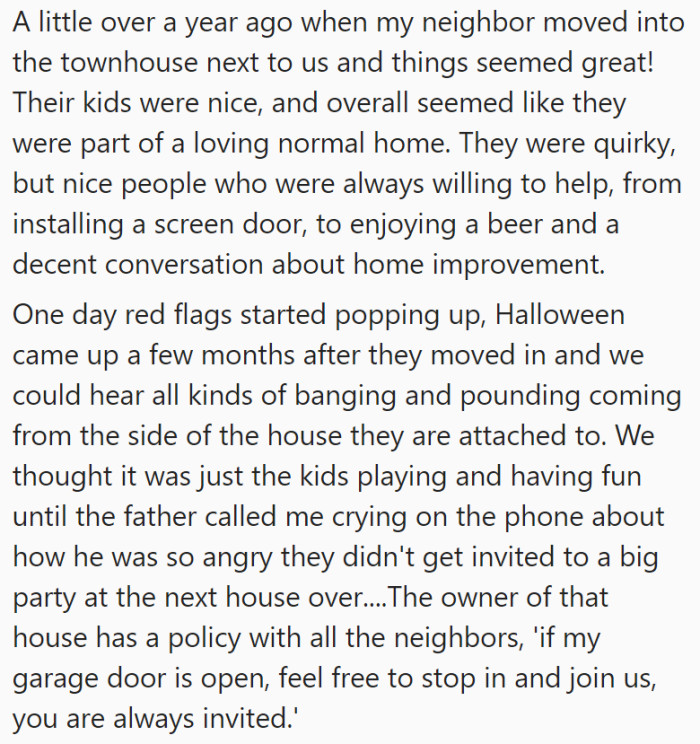
OP's neighbors seemed to be attached to their dog, always coming to see him and taking the pup on walks. It was cute at first until their neighbors started insisting on having the dog on weekends. However, OP's relationship with their neighbors hit the rocks when they caught their neighbor's kids mistakenly scratching their car, only for the parents to ask them to call the police after they came over to make a report.

Attachment Styles and Pet Ownership
The conflict over shared custody of a pet taps into deeper psychological concepts, particularly attachment styles. Dr. Emily Johnson, a psychologist specializing in attachment theory, explains that pets often play a significant role in emotional support and companionship.
Research indicates that for many, pets can fulfill social and emotional needs that are unmet in human relationships, which can lead to strong attachment behaviors toward them.
The Emotional Bond Between Pets and Owners
Dr. Karen Roberts, a researcher at the University of California, Berkeley, highlights the profound emotional connections humans form with their pets. This attachment is often compared to family bonds, emphasizing the role pets play in emotional support and well-being.
According to her studies, the loss or potential separation from a pet can lead to significant distress, paralleling the responses seen in human family separations. This phenomenon illustrates the depth of attachment individuals can develop with their animals, often viewing them as integral family members.
Here's how the Reddit community reacted to the story:
Seems OP's neighbors want joint custody of their dog.

This Redditor has a similar story.
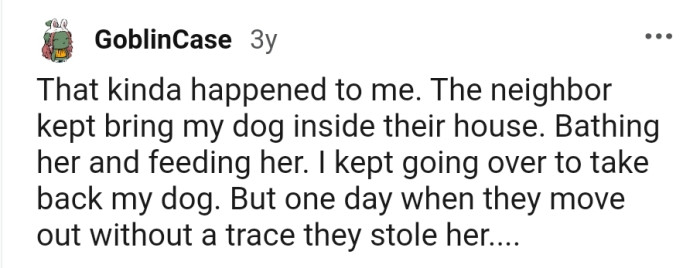
OP should ensure that they have all the necessary ownership documents, just in case...
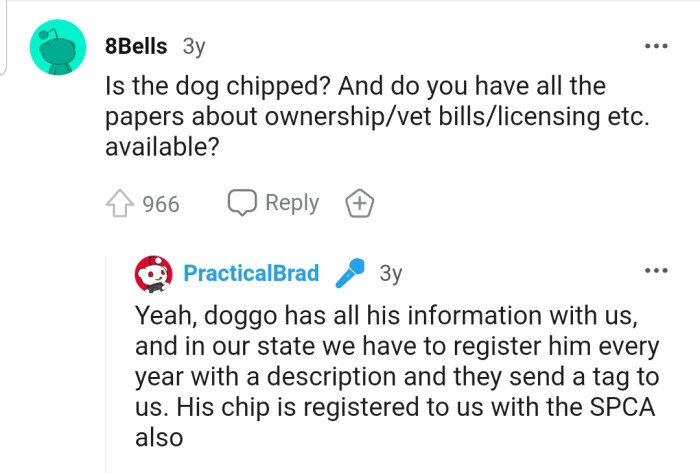
When faced with the prospect of losing a beloved pet, emotions can run high, often resulting in defensive and protective behaviors. Studies in behavioral psychology show that individuals may react strongly to perceived threats to their emotional well-being, leading to drastic measures, as seen in this case.
Understanding these emotional triggers can help individuals navigate conflicts more effectively, recognizing that their reactions may be driven by deeper fears of abandonment or loss.
The desire to retain custody of a pet can also be rooted in deeper psychological needs for control and stability. Research indicates that when individuals feel threatened or powerless, they may react strongly to protect their perceived sources of emotional support, such as pets.
Behavioral studies highlight that these reactions can often stem from past traumas or instability in relationships, where the pet represents a safe haven amidst chaos.
"How do you draw the line without being too disrespectful?"
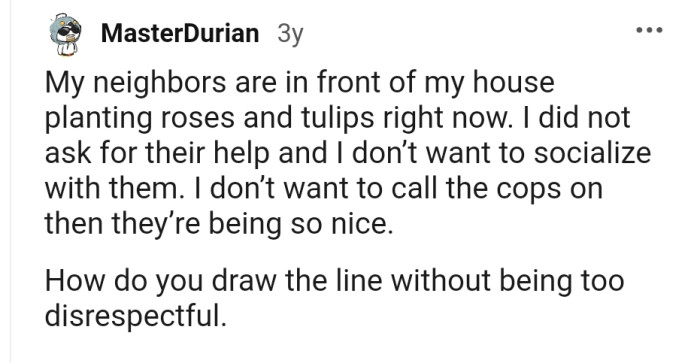
People reveal their true selves with time.
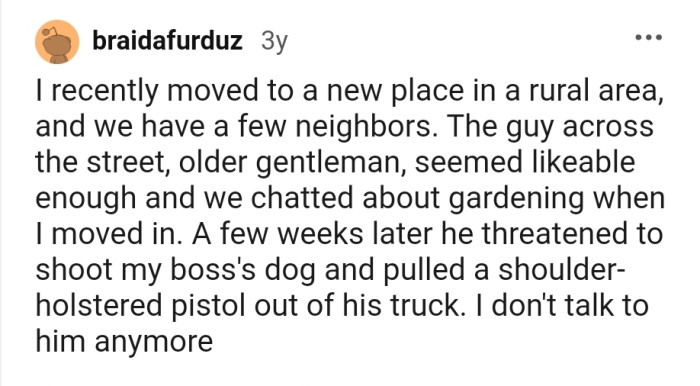
"Why would a grown man cry about not being invited to a neighbor's party?"

Coping Strategies for Conflict Resolution
To address conflicts around pet ownership, it’s essential to employ effective coping strategies. A family therapist suggests utilizing mediation techniques, where both parties can openly discuss their feelings and needs regarding the pet.
This approach not only fosters understanding but also reinforces the importance of collaboration in shared responsibilities. Utilizing structured communication can significantly reduce misunderstandings and conflicts.
Practical Steps for Navigating Pet Custody Disputes
In situations where pet custody becomes contentious, it’s vital to prioritize open communication and compromise. Effective negotiation strategies, such as mediation, can help both parties articulate their needs and arrive at mutually agreeable solutions.
Additionally, involving a neutral third party can facilitate discussions, ensuring that emotions don’t overshadow the practical considerations of pet care. Research shows that collaborative approaches often yield better outcomes in custody disputes, reducing conflict and promoting cooperation.
The first red flag was pretty obvious.

A lot of people seem to have had experiences with "weird" neighbors.
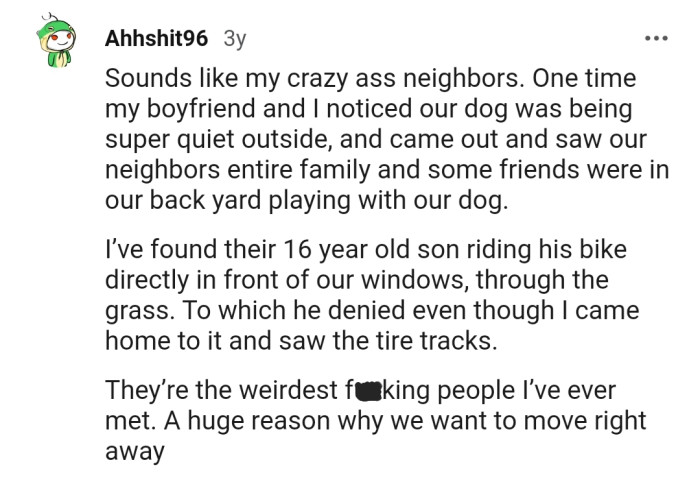
"If the lady wants custody of the dog that badly, tell her to take a paternity test."

Additionally, establishing clear agreements about pet care responsibilities can help mitigate disputes. Research supports that having a written agreement regarding pet custody and care can provide a framework for accountability and reduce emotional stress during disagreements.
This proactive approach allows both parties to feel respected and valued, ultimately enhancing the cooperative spirit necessary for shared pet ownership.
At this point, everyone needs to start keeping an eye on the whereabouts of their pets. Weird neighbors might be lurking.
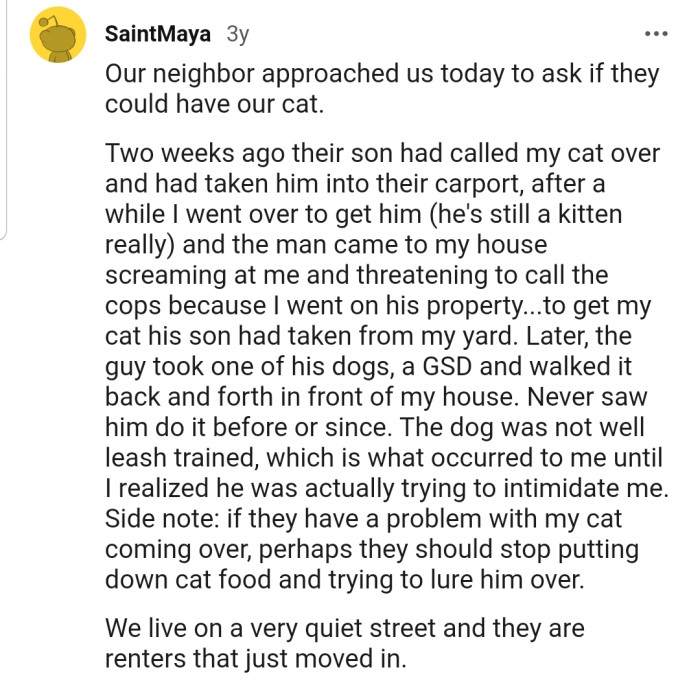
"Two words to protect you and your family: Security Cameras."
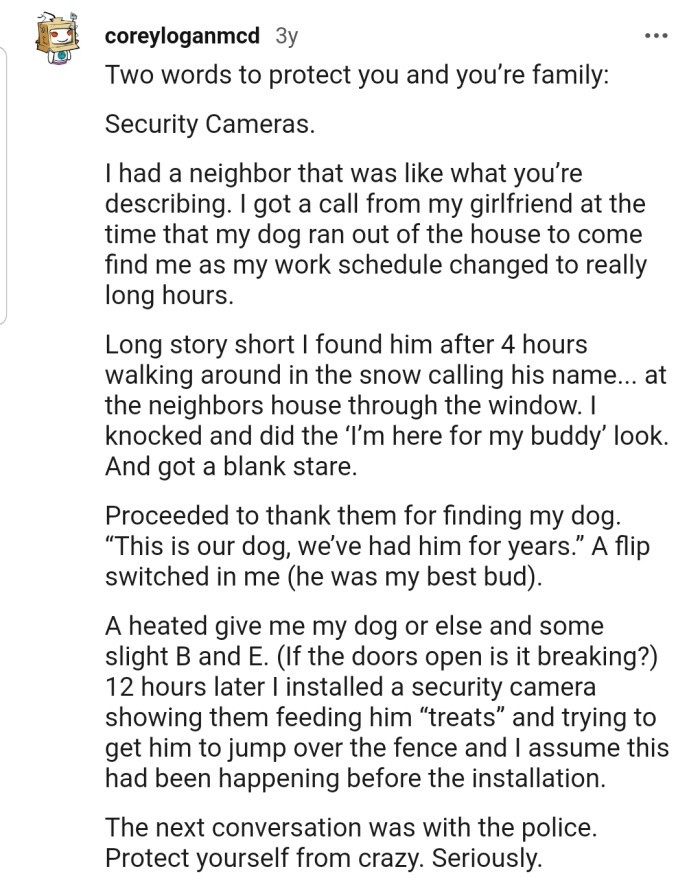
The commenters agree that OP’s neighbors are acting quite strangely and definitely deserve the "entitled" tag.
According to them, it’s evident that the neighbors believe they co-own the dog. OP should really keep an eye on their pet to avoid a canine kidnapping.
What do you think? Would you agree to share your dog with your neighbor if they asked? Tell us in the comments below!
Psychological Analysis
This scenario illustrates the strong emotional ties people have with their pets, often leading to intense feelings when custody is contested. From a psychological perspective, these attachments highlight the importance of addressing the emotional needs of all parties involved in such disputes.
Analysis generated by AI
Analysis & Alternative Approaches
Understanding the emotional dynamics at play in pet ownership can help individuals navigate disputes with greater empathy and clarity. By recognizing the profound bonds formed with pets, parties can approach these conversations with care and consideration.
Utilizing effective communication and negotiation strategies can lead to resolutions that honor the needs of both the pets and their owners.
Psychological Analysis
This situation illustrates a typical reaction when individuals feel their emotional attachments are threatened. The strong response can be attributed to deep-seated fears of losing an important source of comfort and companionship.
Encouraging open dialogue about feelings and expectations can help transform this conflict into an opportunity for growth and understanding.
Analysis generated by AI
Analysis & Alternative Approaches
Ultimately, the dynamics surrounding pet ownership highlight essential psychological principles related to attachment and emotional regulation. Understanding these factors can lead to healthier interactions and more effective conflict resolution strategies.
As studies show, fostering communication and establishing clear boundaries can significantly improve relationships, whether with pets or among people.



